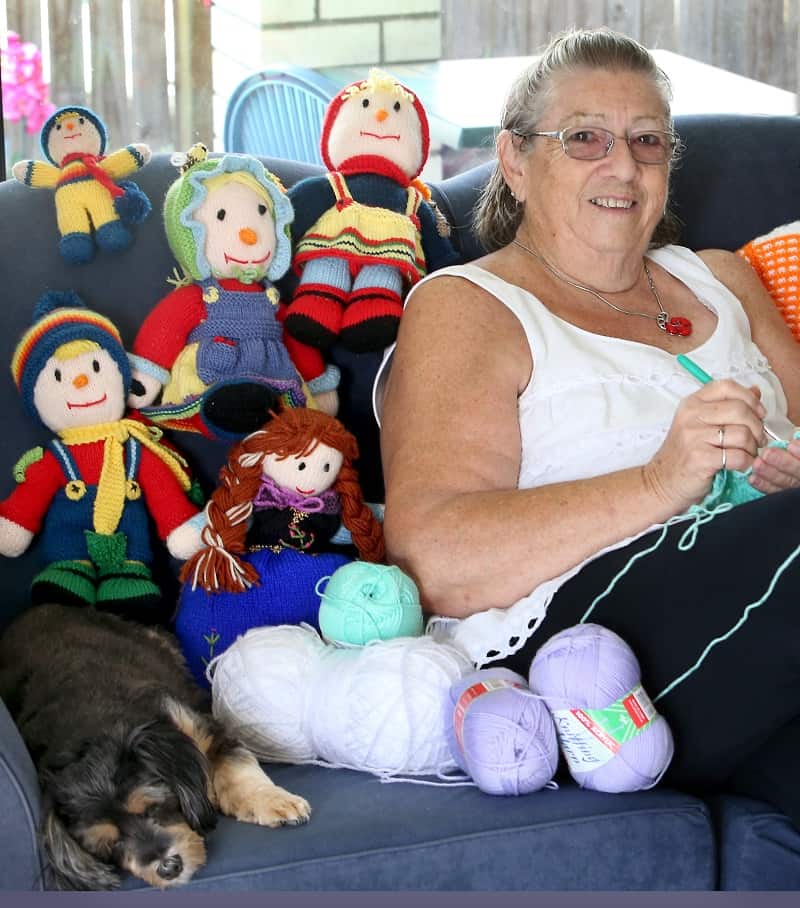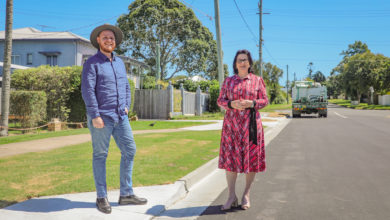
Sandra Fenton, now 70, was 67 when she was diagnosed with stage four ovarian cancer.
Instead of getting her affairs in order she thought ‘I’ve got it now let’s get on with it’, she underwent chemotherapy and surgery and she has been cancer free ever since.
What was the reason I survived when so many others don’t?
The answer, she has decided, must be this – to pass on the message to others and spread awareness.
Ovarian cancer symptoms can be common, so it was easy to explain away the pain in her tummy and tiredness.
“I was about to leave New Zealand to come to Australia to help look after my grandchildren. I was working 10 hour shifts and trying to organise everything for the move,” Mrs Fenton said.
“I was tired but I was working so much.”
It made sense: even her doctor at the time agreed that this was probably the case.
She also had lower pelvic pain, but nothing extreme.
“It was more of a niggle,” Mrs Fenton said.
“I didn’t realise it was a symptom.”
After arriving in Ipswich, Mrs Fenton still didn’t feel right but put it down to the move.
“I felt lethargic, I became withdrawn, but I put it down to the heat. I used to love dancing, but instead I stayed home in my room,” she said.
“I had horrendous night sweats, but I thought it was because I was still going through ‘the change’.
“It wasn’t until I woke up one day looking like I was nine months pregnant that I went to the doctor.
“After I went for scan and ultrasound, I was admitted to Ipswich Hospital when I found out I had cancer which had spread from my ovaries, through my stomach lining and into my lungs.”
She originally received oncology treatment, including chemotherapy, at Ipswich Hospital and the Mater Hospital Brisbane, but the expansion of the oncology ward at Ipswich Hospital in 2017 allowed Mrs Fenton to access all her care closer to home.
“We had an amazing team. My doctors and nurses were fantastic,” Mrs Fenton said.
“The oncologist at Ipswich Hospital told me that I am fantastically perfect.
“No matter what your age, don’t ignore changes and symptoms or make excuses for them. Go to your doctor. Never think that you’re wasting the doctor’s time with a minor concern. We women need to overcome embarrassment about seeing a doctor for women’s health issues.
“We need to talk about these things.”
She is also concerned about misconceptions women might have about ovarian cancer, including family history or screening.
“It’s not in my family history or genetics – we did a test. Just because it’s not in your family doesn’t mean you’re safe. You can’t pick it up with a Pap smear,” Mrs Fenton said.
Her journey was made easier my her granddaughter who was only just turned 5 when she was diagnosed.
“She wouldn’t leave my side. She would come to hospital with me,” she said.
Although Mrs Fenton has everything to live for, she still struggles with survivor guilt when she thinks of others who die from cancer.
“Sometimes the guilt sets in, how did I make it and they didn’t?” she said.
“What was different about their cancer to mine?”
abdominal or pelvic pain, pressure or discomfort
increased abdominal size
persistent abdominal bloating
excessive fatigue or lethargy
needing to urinate often or urgently
changed bowel habits
feeling full after only eating a small amount
appetite loss
indigestion
unexplained weight loss or gain
irregular periods
bleeding in-between periods
post-menopausal bleeding
Ovarian Cancer Australia recommends women keep a symptom diary. This will help them track their overall health, and record possible symptoms of ovarian cancer or other less serious conditions. They recommend seeing a GP if any of the symptoms of ovarian cancer are experienced multiple times during a 4-week period.
A GP may conduct a physical examination, blood tests, an ultrasound or other imaging tests to check for ovarian cancer, though a definite ovarian cancer diagnosis is made through surgery. Women should return to the doctor for further tests or seek a second opinion if, like Sandra, symptoms that were attributed to another cause persist.
Information: Queensland Health

